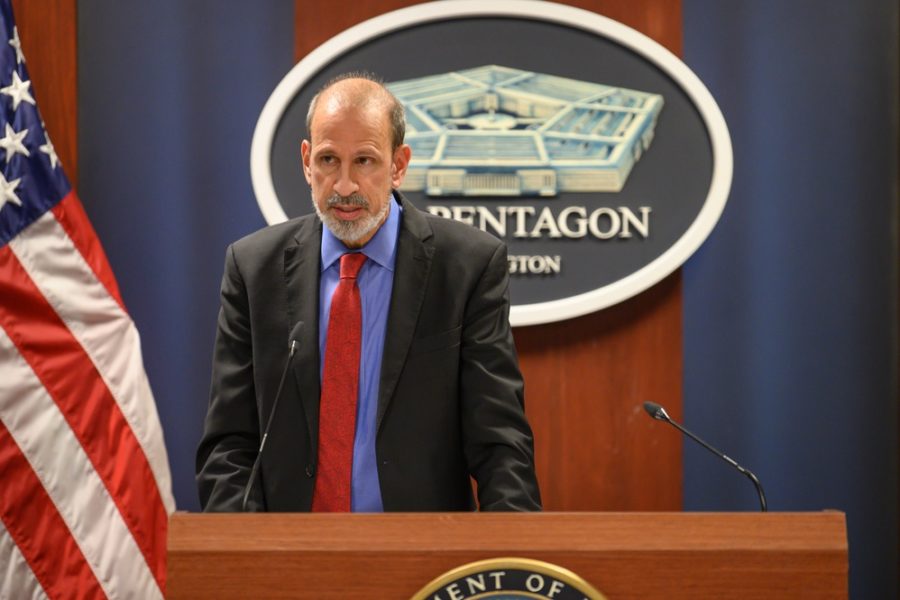Concern over inflation has impacted the Pentagon’s planning for the fiscal 2023 budget request, the Defense Department’s top financial official said March 9. But, the budget is “substantively” complete, and space figures to be a foundational part of it, he added.
Comptroller Mike McCord, speaking at the McAleese conference, teased that there is a “projected date” for the release of the 2023 budget, which has been delayed for more than a month. But that date hasn’t been finalized, and McCord said he still hopes to have the National Defense Strategy, also delayed, rolled out before the budget request.
When the budget does come, many observers will be focused on how it addresses the recent spike in inflation, which has reached record highs. If the budget is built off an assumption of continued high inflation, it could be a “downer” for the stock market; but if it quotes an escalation of just two percent, it could be criticized for lowballing the number and being unrealistic, analysts have said.
“One other thing that’s new for us: having to worry about inflation again, for the first time, certainly since the housing bubble, the housing crash, and the Great Recession of 2008,” McCord acknowledged. “But, actually, it’s been much longer than that that we’ve had to seriously track and worry about inflation. So that’s been a big part of what I’ve been working on in building the [2023] budget, but also just a day-to-day challenge that is not one that we’ve had before.”
At the same time, McCord argued that the commonly cited measure of inflation—the consumer price index, which has risen 7.5 percent in the last 12 months—is not applicable for the DOD. Instead, he cited the GDP Price Deflator, which measures inflations based on prices of goods and services produced inside the United States as well as exports, as a metric that is “fairly accurate for us.” McCord claimed the GDP Price Deflator is “not running at anything like 5 percent.”
“We are not facing 7 percent inflation in the Defense Department,” McCord said. “Now, what’s going to happen in the future, obviously, if I knew that, I would be doing something else for a living. But the big concern that we’ve had, that I’ve had, is catching up. Inflation is a here-and-now thing; we build budgets one year at a time, and inflation tends to get looked at [as] inflation from ’22 to ’23.”
The last time the Pentagon’s budget experts formulated key economic assumptions that inform the budgeting process was more than a year ago, McCord said—before he was confirmed to his position. In this budget cycle, he and his team worked to update those assumptions.
“The biggest near-term concern that we have, really, is the inflation that did occur in [2021] that was higher than projected, inflation that is occurring in [2022] that is higher than projected,” McCord said. “So my emphasis has been on getting us caught up on that as best we can.”
A failure to do so would result in a budget where prices are already outdated. McCord compared it to shopping for groceries, only to arrive at the checkout and realize “prices have changed, everything we put in the shopping cart was priced over a year ago [and] are no longer accurate prices.”
For the general public, perhaps the most urgent concern about skyrocketing prices is gas—fuel costs have reached all-time highs, and those costs are expected to remain high as President Joe Biden has banned the import of Russian gas, coal, and liquefied natural gas into the U.S.
The Defense Department is the federal government’s largest consumer of fuel, but McCord indicated that soaring gas prices won’t affect the budget like other inflation.
“Of course we track the fuel market. We consume 75 percent of the federal government’s energy, so we are very much interested in fuel prices,” McCord said. “We don’t control fuel prices. We can’t impact fuel prices. We are big enough to have a big bill, but way too small to have any impact on the markets. But that has its own mechanism—basically me working with DLA to adjust prices that we charge and then messaging Congress if we need more or less money for that.”
Just as rising fuel costs won’t directly impact the 2023 budget, McCord also said Russia’s invasion of Ukraine, which led to Biden’s import ban, is not substantively altering the budget.
“I want to emphasize that it is not, it’s not a budget that was rewritten at the last minute because of what Putin is doing in Ukraine,” McCord said. “There’s been a lot of reasons, I’m sure familiar to all of you, about why this is taking time.”
Still, McCord acknowledged that Putin’s actions likely will affect how the budget is received by the public, pointing to support for increased defense budgets in Europe in recent weeks.
“I do think that public views are going to change,” McCord said. “And it clearly was shocking to a lot of Europeans to see full-scale war on the European continent. Clearly, if you look at Germany, for example, what could be more striking than their sudden change, and I think a welcome one. But I think that there’ll be a not-quite-as-dramatic impact, but a similar directional … impact in the United States.”
McCord’s comments were short on specifics about what will actually be in the budget, but he did offer a brief preview, highlighting the importance of the space domain.
“I would say … space … is probably emerging in our internal reviews as the most important foundational area for everything that we’re doing, everything that we need to be doing, whether it’s versus China, versus Russia, anybody else,” McCord said.
For fiscal 2022, the Space Force requested a $17.4 billion budget, roughly a 13 percent increase year over year. The appropriations bill currently being considered by Congress would boost that total to $18 billion.


